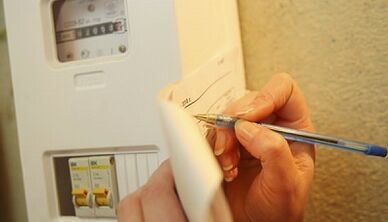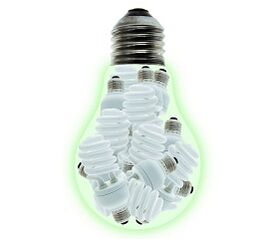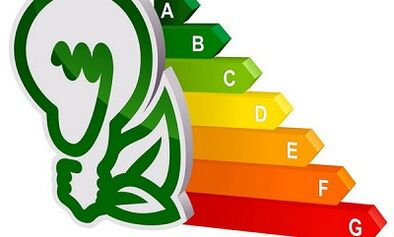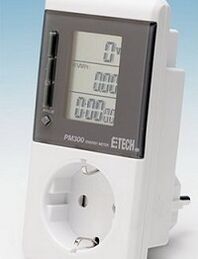The topic of electricity economy excites many.People continue to look for all known (and still unknown) ways to do so more efficiently.Today we will share effective ways.
Obviously, some of these methods are obvious and many have been using them for a long time, but however, the resulting information obtained in the form of small instructions for careful electricity consumption.
Method 1. Do we really need so much light?

All knowledge statistics state that 14% of all electricity generated is spent on lighting.But do we always use this amazing amount of additional energy without damage to ourselves?How to learn to do this right?
These simple tips can help you with this:
- Use the electric light as much as possible.We do not ask you to return in primitive times when people have only one daytime lifestyle (although this is undoubtedly useful for our health: doctors have proved that an active nightlife and artificial lighting are chronic fatigue, depression and exacerbation of chronic diseases).
- Do not forget that the degree of lighting of the room is affected by the amount of contaminated lighting devices.Of course, the plafon in the kitchen, which has not been washed for several months, will be covered with a layer of dust and fat and it will be very bad to pass the light.And pure lighting devices significantly illuminate the room, which means you can use lamps.
- Don't forget the clean windows.Natural light and sunlight will not only postpone time to turn on lighting devices, but also heat your room at the cold season.
- It can be used when lighting the room, for example combined lighting: Do not light all lamps on the chandelier at the same time or turn on: a table lamp (floor lamp) and 1-2 lamps of a chandelier.
- Modern energy saving devices can help in the economy of electricity: dimmers (rotary light regulators that gently alter light level), motion sensors, impulse relays, digital switches.A built automatic shutdown system works very effectively at the input.
- We use energy rescue lights (compact fluorescent, LEDs).
- And very simple - turn off the light when you get out of the room (in fact, this is probably the hardest - in many houses there is a constant "war" because everyone forgets to turn off the light).
A little about the advantages of energy rescue lamps:
- A more effective electricity consumption (compared to incandescent energy that consumes energy 4-5 times less).
- Large light output: A lamp that saves power with a capacity of 12 W in terms of light intensity is approximately 60 watts of a common incandescent lamp.
- It does not emit thermal energy in large quantities (this property can be used on small lighting devices) and distributes light more evenly and smoothly (the usual lamp is not exceeding 10% of the energy consumed in light and the remaining in thermal).
- The life of lamps that save energy, as a rule, is longer.Although not always corresponds to the life of the declared manufacturer.
It is true that the latter is sometimes due to the fact that we do not use some types of lamps that save energy correctly.Most of the time, they burn in places where they are used for a short time and where mode is often changed: "on" - "off".

If you make a replacement in lamp phases, it is better to start with rooms where the lamps work for a long time.In addition, it jumps frequent voltage in the power grid, high or, inversely, very low temperature, greatly affect the working period.It should be borne in mind that some lamps that save energy (fluorescent) cannot be used on devices with adjusting the brightness of the lighting.
Over time, we all need to change completely to Salvador Energy lamps, as the energy conservation law states that incandescent lamps will be completely removed from circulation and replaced by more economical light sources.Therefore, it is better to start doing this in advance, because the replacement immediately of all lamps is quite placed.
The undisputed disadvantage of energy that saves energy is still high cost (although now they are much cheaper than, say, 3-4 years ago), not always of good quality and, unfortunately, we have no points for the reception of lamps (and these economies are very dangerous to us and ecology).
Well, if you can't replace common energy saving lamps, use at least smaller lamps.
METHOD 2. Multi -Tariff meters
The question of the use of multi -Tarfas meters, of course, is not unambiguous.But if we consider that some domestic appliances work all the time (refrigerator) or almost constantly in "sleeping" mode (TV, computers) and then considering your work at night, it can still be beneficial not only for fans of working at night.
In addition, modern multi -barrels take into account electricity much more precisely than induction.
Method 3. Useful Economy
First of all, let's think if we use appliances correctly?
The result of these thoughts for many of us will be disappointing.It has been proven by experts that electrodomers often consume much more electricity than they need for normal operation.
As we have found, many domestic appliances (microwave, televisions, power supply, audio and video equipment, water heaters, computers, air conditioning and a dozen other devices) consume electricity not only in working conditions, but also in "waiting" mode or, as we say, in "sleeping" mode.
Each of these devices consumes a lot of electricity.But if you summarize the consumption of all devices that work in "sleeping" mode in our apartments, small amounts for account payment are not obtained.
Thus, for example, working hours in "awaits" mode for the average TV is 19 hours, for the microwave at 23.8 hours, for a compact speech at 23 hours a day.
As a result, this represents 5 to 10% of the total electricity consumption in the apartment.
And what is the output?And the output is very simple.Always turn off the devices of the not used outlet.
Method 4. Technology Miracles

Obviously for everyone: You can't save much with an old refrigerator or TV.Appliances produced 15 to 20 years ago consume electricity 2 times more.
One way out of this situation: Buy modern appliances -domestic efficient.How to find out how this is efficient in terms of energy or that device?
To do this, carefully study the energy efficiency label, which must be on appliances.It has signs of letter from one (the highest class of energy efficiency) to G (the lowest).
In modern devices, electricity consumption, even in "waiting" mode, is much smaller than in outdated models.
As an example indicative of efficient energy technology, for example, "smart" dishes or washing machines, which automatically measure detergents, water consumption, choose the desired regime.According to experts, these devices consume 44% less energy and 62% of water than outdated models from the late 1990s.
It is not worth convincing the advantages of modern technology.But what if not everyone can replace old appliances with a new (usually expensive)?How can I reduce electricity costs in this case?
Method 5. We use what we have
Refrigerator
How to use the refrigerator, probably everyone knows.But yet we stubbornly stubbornly put it beside the batteries, stove or near the sunny wall.
But it is obvious that, heated from nearby heat sources, the refrigerator to effective work will consume more electricity.
In addition, it is desirable that, in the room where the refrigerator is, not hot (about 18 to 20 degrees), the refrigerator should be thawed and regularly released from ice, check its voltage (sealing in the refrigerator doors), do not put near the wall to improve air circulation.
Also, you should not buy a large refrigerator just because you are fashionable or are the same with a neighbor in the kitchen (proceed with your family members and your needs).The larger the refrigerator, the more energy consumes.
Vacuum cleaner
For the normal operation of a powder vacuum cleaner with less electricity consumption, it should be clean regularly accumulated (dirty consumes 15 to 20% more) and take into consideration that it uses more electricity when turning on and off (if you aspire to small room, try not to turn off too often).
Electric stove
An electric stove consumes a lot of electricity.How can I reduce electricity costs in this case:
- Do not heat the oven in advance if this is not provided for a recipe for cooking a plate.
- Use the residual heat of the fireplace (turning off 5 to 10 minutes before the end of cooking).
- Close the pots with lids.
- Do not use excess water when cooking vegetables and eggs.
- Use good dishes with a smooth background and the size of the burner.
- Use the pressure cooks.
- Use an electric kettle (consumes less electricity than an electric stove) while buying enough electric kettle for the whole family and pour as much water as you use at a time.
- Use a microwave and toasted oven, where you can cook a dish equally tasty and crispy in just a few minutes than in the oven.But this is much faster and therefore it is more economical.
Washing machine
The washing machine spends up to 15% of electricity at home.Use all possibilities of economic consumption of electricity, which are foreseen by the instructions for your washing machine:
- Fast and economical wash modes.
- Full load, but without overload (excessive load increases electricity consumption to 10%).
- The lowest temperature (should not always be washed at high temperature).
- Operation mode selected correctly from the machine.
Iron
- Here you can also use the residual heat principle, ie turn the iron 5 to 10 minutes before the end of the iron.
- Do not dry linen: To caress it, you will have to spend more time and therefore use more electricity.
- Unexpected linen will also require additional electricity consumption.
- Use irons with an automatic shutdown function.
- Use the modes correctly to pass the different types of fabric.
Air conditioning
- Set enough temperature to cool the room correctly.
- Before turning on, make sure all windows and doors are closed.
- When buying an air conditioner, focus on the size of the room and the number of people who will be in it.The device, designed for a large area, simply "eating" electricity without any benefit.
- Clean the fans and filters regularly.
Computers
Almost everyone has computers today and not even in the family.And of course this significantly increases electricity costs.
What can we do?
- Reduce monitor shine (this affects energy consumption).
- Turn off your computer if you don't use it for long.
- Call all peripheral devices (scanners, printers, modems) through the network filter and always turn it off when these devices do not work.
- If possible, use liquid crystalline monitors.
- Use a more frequent laptop (it "eats" less energy than a stationary computer).
Heaters
The cold on the street and at home makes us catch the heaters from the pantries.Is there no heat in the house?What to do?Furify is reluctant to get sick.Therefore, you should include "Eater" electricity - heaters.
To somehow reduce the heater time, you need to isolate everything possible: windows, walls, floors and so on.Obviously, plastic windows are good for this task.Well, if the windows are common, try to close all cracks and cracks in the paintings of the window.It is through them that up to 50% of heat disappears.The same must be done with the front doors.
What if the central heating is already on, but is it still cold?
There may be many reasons.But in some cases the simple washing of old batteries, replacing or increasing their heat transfer due to increased additional sections.
Well, try to use the heaters, if possible, not to use, they are very "voracious".
Also, as an option for an additional heat source in the apartment, you may consider a warm towel rail, connected to the hot water supply.
Interesting about it

There is a very useful device.It is called "domestic Wattmeter".
Why is it necessary?This will help save electricity.With the help of this small device, you can learn many interesting things about the work of your appliances and usually about the expense of electricity in the house.
For example:
- How much do you pay for excessive computer that does not disable all day?
- How much electricity does your refrigerator consume and is it time to change it to a new one?
- How much electricity is consumed when you wash the dishes on the dishwasher, wash clothes, caress or dry your hair?
- How much energy your TV consumes in the state of off?
You will receive an answer to all these questions and many other people, and you will also find out how much electricity has been spent without benefit and what you can really save.
Obviously, saving electricity is not so difficult.The main obstacle probably consists of ourselves.As soon as we realize that not wasting electricity in vain is profitable, first of all, for us - we will be successful.
























